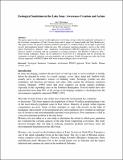| dc.contributor.author | Rwabigene, Alex F | |
| dc.date.accessioned | 2015-11-10T09:45:36Z | |
| dc.date.available | 2015-11-10T09:45:36Z | |
| dc.date.issued | 2004 | |
| dc.identifier.citation | Ecological Sanitation in the Lake Zone: Awareness Creation and Action Alex F. Rwabigene Water Quality Management Section, Tanzania Home Economics Association. (TAHEA) P.O. Box 11242, Mwanza Phone: 011-255-28-2502555 | en_US |
| dc.identifier.uri | http://hdl.handle.net/11671/749 | |
| dc.description.abstract | The paper expresses the concern on the haphazard over flowing sewage within the unplanned settlements of
the lacustrine communities of Lake Victoria basin and its impact on human health and Lake Biodiversity.
The paper reviews the present sanitation methods and opens its weakness/failure in the light of persistent
poverty and population density within the area. The ecological sanitation principle is given as the viable
option. Participatory Hygiene And Sanitation Transformation (PHAST) approach is pointed out as an
effective method of dealing with the community in creating awareness. The PHAST is linked to field –
based testing techniques, which can be analyzed at local level. It is anticipated that by involving the
community ecological sanitation can gain popularity and acceptance. Finally the paper provides the South
African experience on PHAST linked with water testing techniques and cost involved. | en_US |
| dc.language.iso | en | en_US |
| dc.publisher | Lake Victoria Environmental Management Project (LVEMP) | en_US |
| dc.subject | Ecological Sanitation | en_US |
| dc.subject | Community involvement | en_US |
| dc.subject | PHAST approach | en_US |
| dc.subject | Water Quality | en_US |
| dc.subject | Human excreta | en_US |
| dc.subject | Re-use | en_US |
| dc.title | Ecological Sanitation in the Lake Zone: Awareness Creation and Action | en_US |
| dc.type | Article | en_US |

